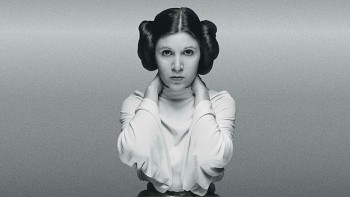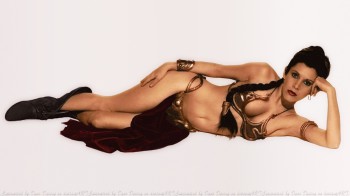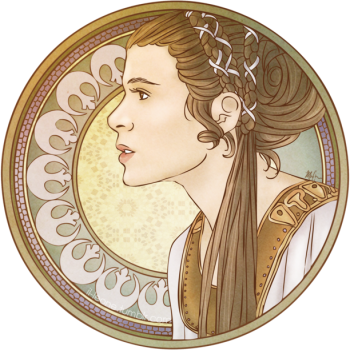Art of the Genre: Art of the Iconic Female #5: Princess Leia
 Today continues the Art of the Genre series on the Iconic Female. If you’ve missed any of the others, click on the hotlinks to find #1, #2, #3, and #4, and now on to the good stuff!
Today continues the Art of the Genre series on the Iconic Female. If you’ve missed any of the others, click on the hotlinks to find #1, #2, #3, and #4, and now on to the good stuff!
I was six when Star Wars was initially released. I did get to see it in the theater, but I more remember the feel of the venue and the oddity of the aliens rather than if I had an emotional attachment to Princess Leia. I know I must have enjoyed the film because my house quickly filled up with Star Wars figures, posters, and memorabilia, but none of this led to a particular ‘love’ of Leia. Honestly, the only true memory of Leia I had in those early days was that her very thin and small laser pistol was lost when I tried to put her in Luke’s landspeeder. To this day, I swear it is still ingeniously stuck inside that toy even though the odds are that it was devoured by my mother’s two inch shag carpeting where the incident occurred.
Nonetheless, Leia didn’t ‘blossom’ for me until the release of Empire Strikes Back, where, like Han Solo himself, I became smitten with her. By this point, in 1980, I was a precocious nine year-old who was just beginning to truly understand that girls had more to offer than all my friends had previously surmised. I well remember my Cloud City play-set, and the outstanding Han Solo figure with blue jacket that could stand proudly beside the intricately woven hair of Cloud City Leia. I’m also pretty sure this was the first time I ever saw a kiss onscreen that didn’t make me look away, so certainly some things were readily changing in my view of this iconic character.
 By the time of the release of Return of the Jedi in 1983 I was a full blown twelve-year old who was mixed up in the drama of junior high. It was a time of girls in parachute pants and huge hair, so Leia’s space style always seemed more charming than reality. However, upon seeing the infamous and geek-orgasmic Leia Slave Girl scene, my life was changed as much as any young man in the 1980s, and from there all bets were off about how we all define Leia.
By the time of the release of Return of the Jedi in 1983 I was a full blown twelve-year old who was mixed up in the drama of junior high. It was a time of girls in parachute pants and huge hair, so Leia’s space style always seemed more charming than reality. However, upon seeing the infamous and geek-orgasmic Leia Slave Girl scene, my life was changed as much as any young man in the 1980s, and from there all bets were off about how we all define Leia.
Suddenly, Princess Leia Organa morphed from a beloved snarky, intelligent, tough female protagonist to an impossibly dreamy science fiction sex symbol. No matter how many times she strangled Jabba with his own chain, she wasn’t going to shake that golden bikini image from our minds.
In my opinion, for good of for bad, this one scene defined Leia more than any other. After it, her induction into the ranks of The Iconic Female hall of fame is without a doubt first ballot material.
 Artists around the globe have been rendering images of Leia for the next thirty years, be she white and virginal or slave-tastic, we are all hooked. By this point, the only real drawback to this obsession is that Leia was played by an actual actress, Carrie Fisher, who is now the ripe old age of fifty-seven. Couple standard human decline with extended drug use, mental illness, and general hard living, and you have a perfect cocktail for tail spinning a man’s childhood love affair with her most famous character.
Artists around the globe have been rendering images of Leia for the next thirty years, be she white and virginal or slave-tastic, we are all hooked. By this point, the only real drawback to this obsession is that Leia was played by an actual actress, Carrie Fisher, who is now the ripe old age of fifty-seven. Couple standard human decline with extended drug use, mental illness, and general hard living, and you have a perfect cocktail for tail spinning a man’s childhood love affair with her most famous character.
Honestly, Fisher can’t catch a break with this one, and I feel for her. Even in 1974, at eighteen, Carrie was told by George Lucas that to be given the role of Leia she needed to lose ten pounds (to which Fisher jokes that they wanted them all to come out of her cheeks) and word on the blogosphere today indicates that J.J. Abrams told her she needed to lose thirty pounds to be recast in Star Wars Episode VII.
Whatever the case, there is still a singular underlying vision of Leia that permeates geek culture today, and the art of her will continue to spill out in all its lovely curves well after the woman who made her famous is gone, be that both bitter and sweet.
There is no mistaking that Princess Leia is an Iconic Female who has entrenched herself in the imaginings of several generations of young men, and even though some dreams might get dented along the way, I’m very happy that she will once again reach the silver screen in Star Wars Episode VII.
If you like what you read in Art of the Genre, you can listen to me talk about publishing, and my current venture with great artists of the fantasy field, or even come say hello on Facebook here. And my current RPG Art Blog can be found here.
Leia…
Never caught on with me. Never bought into the character for some reason or another.
Now Col Wilma Deering (Erin Gray), or the ladies from the original BSG…
That is a different story.
TW: I hear you on Erin Gray, yet I’d wager if you walked around asking folk on the street who Wilma Deering was, she wouldn’t be considered an Iconic Female. Still, Space Vampire still gets me worked up to this day… Oh! And I got to meet Erin in L.A. a couple of years back and she could still pull off a nice Buck Rogers reunion movie and make all our hearts flutter 🙂 [and she’s 64]
What make a lot of those ‘Seventies movies so interesting is that you can sense a palpable resentment on the part of the actress at having to play role which turns her into a sexual object. Pretty understandable, really. That’s the impression I got from Carrie Fisher’s performance anyhow, although I accept that they did try to make her character fractionally more dimensional than your average Bond girl. As a boy on the cusp of adolescence Erin Gray in that figure-hugging space suit is a fond memory; that and the girl from ‘Black Beauty’ – a British series about a horse that never probably never saw the light of day on your side of the pond.
I remember the villains and female side characters from Buck Rodgers more than I remember Erin Gray–wow!
I re-watched the whole series a year or so ago and I could not believe how seductive some of those outfits were. How’d they get away with that back in the 70s?
James M: You know, the 70s piggybacked on the movements of the 60s when women not only were becoming ‘liberated’ but enjoyed the freedom it provided. It wasn’t until the late 1980s that the backlash of sexism hit and sex suddenly wasn’t PC anymore. Look at the S&S covers during the 1970s from the likes of Frazetta, Kelly, and Boris if you want to see how much the U.S. ‘got away with’ when it came to sex. And I have to say, as lovely as Gray was, I think my first real sexual thoughts were about Pamala Hensley [Princess Ardala]. The same can be said for Ornella Muti [Princess Aura] in Flash Gordon 1980.
I actually had the DVD of the Buck Rodgers series and I remember on the extras someone saying that Erin Gray’s character represented the “good girl” that the kiddies were supposed to return to each week and root for while Pamela Hensley’s character was what dads returned each week for.
I think I get that now.
BTW, I can think of some other series from around the late 70s/early 80s that I didn’t quite “get” at the time because I was pre-puberty. Shows like Wonder Woman with Linda Carter and The Dukes of Hazzard, with whoever the actress was that played Daisy Duke.
I think I realized the attractiveness of these women as a young boy, but I wasn’t really connecting with the notion of their sex appeal at the time. Now, in 2014, I’m not really comfortable with watching these old shows.
Dearest Art – So sorry for the belated comments, but you know how things get around here the closer the days march toward Halloween.
I have truly enjoyed your iconic female series and was particularly impressed with your research on the Succubus (don’t you just hate it when an independent woman gets a bad rap?).
If I may speak for us few girls in the Black Gate office, we sincerely appreciate the fact that you appreciate our brains as well as our chain mail bikinis…
Yours,
Goth Chick
Lovely Chick, thank you for the kind words. I’m glad you enjoyed the Succubus, and I’m also you backed up my Princess Leia post with some nice shots of Star Wars Episode VII. And yes, I love the women of Black Gate, brilliant and sexy, what better combination is there? 😉
[…] Art of the Genre: Art of the Iconic Female #5: Princess Leia […]